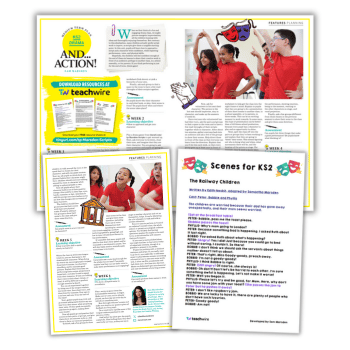PDF medium-term plan and resource sheets
KS2
Years 3-6
When we first think of fun and engaging KS2 drama lessons we might picture energetic improvisation; all the children buzzing with ideas and thoroughly enjoying themselves.
But contrary to this idealisation, many children actually prefer script work to improv, as scripts give them a tangible starting point.
In this unit, pupils will learn how to approach a drama script and character with confidence, while exploring performance, voice and physical skills.
Hopefully children will feel confident enough at the end of these six lessons to share their creative work in front of an audience; perhaps to another class, in a school assembly, or for parents. If you think performing is just for the end of term, think again!
Included scripts
This download includes extracts from scripts suitable for KS2, all adapted by Samantha Marsden.
- The Railway Children
- Hansel and Gretel
- Oliver Twist
- A Little Princess
Drama lessons KS2 learning objectives
Learn how to:
- Approach a script
- Approach, and get into, character
- Physicalise a character
- Project and speak clearly in character
- Show a scripted scene to an audience
Week 1 activities
Print out enough scripts so that every pupil can go home with one. You don’t need a licence to perform the provided scenes, as they are works out of copyright (adapted for young performers).
As a class, read the scenes together. You might choose to read them out loud yourself or have pupils sight-read them (the first option will take less time).
After this, ask pupils to choose the scene they’d like to work on, and the character they’d like to play. Alternatively, you can choose for them.
It’s okay if one scene is more popular than others and handed out to two, three, or four groups, as each pair or group will have their own take on the scene.
Once everyone has been assigned a scene, a part to play, and a partner or group to work with, get them to highlight their part. Ask them to learn the words to the script at home over the next two to three weeks.
Character research
Next, ask pupils to find out about the book or play their character is from, paying particular attention to when and where their scene takes place.
You may like to do this by:
- giving them access to computers
- bringing in the books the scenes are from
- giving a short synopsis of each scene yourself
After this, play a drama game to help pupils feel less inhibited about performing. Choose one from the included drama games worksheet or pick a favourite of your own.
Finally, ask each group to find a space in the room to have a few read-throughs of their scripts together.
Sam Marsden has taught drama for 15 years in a variety of settings. She’s the author of 100 Acting Exercises for 8–18-year-olds, Acting Games for Improv, Drama Games for Early Years, and Acting Exercises for Creative Writing. Visit her website at marsdensam.com











